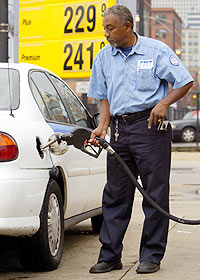forum
library
tutorial
contact

John Kerry's Energy Policy
A Trio of Surprises
by Staff
The Economist, August 12, 2004
|
the film forum library tutorial contact |

|
John Kerry's Energy Policy
by Staff
|
The greens' favourite shows his spots
FOR months, John Kerry has been bashing George Bush on energy. Mr Bush's foreign wars, he argues, have increased the risk of America's reliance on oil from the turbulent Middle East. Policies at home amount to coddling for Mr Bush's pals in the energy industry. And the president's policies are remarkably ungreen.
For ages, Mr Kerry's own policies have been a mystery. His slogan has been “energy independence”—a vacuous and misleading phrase used by politicians of both parties. Since America guzzles a quarter of the world's oil but sits on only 3% of its proven reserves, it will never be “independent” of oil—at least, not until that distant day when it replaces all its petrol-fired vehicles with something radically different.
 Now, in a speech near Kansas City on August 6th, Mr Kerry has fleshed out his views in proper detail. He began in familiar fashion, by blaming the Bush administration's policies in the Middle East for adding $8-15 a barrel to the price of oil. To encourage home-grown alternatives to Saudi oil, Mr Kerry would spend some $30 billion to subsidise carmakers and utilities to convert plants to cleaner technologies and to encourage Americans to buy cleaner cars. He has also set a target of 20% for renewables in both the power sector (through wind and solar power) and car fuels (through biofuels such as ethanol).
Now, in a speech near Kansas City on August 6th, Mr Kerry has fleshed out his views in proper detail. He began in familiar fashion, by blaming the Bush administration's policies in the Middle East for adding $8-15 a barrel to the price of oil. To encourage home-grown alternatives to Saudi oil, Mr Kerry would spend some $30 billion to subsidise carmakers and utilities to convert plants to cleaner technologies and to encourage Americans to buy cleaner cars. He has also set a target of 20% for renewables in both the power sector (through wind and solar power) and car fuels (through biofuels such as ethanol).
There are three surprises here. First, Mr Kerry's overall policy bears more than a passing resemblance to Mr Bush's. Can you guess which candidate strongly supports nuclear plants, wants $10 billion in subsidies for helping today's coal plants get cleaner, more money for tomorrow's “clean-coal” technology and even proposes billions in giveaways to the car industry? Yes, Mr Kerry. He, too, needs votes among the car plants of Ohio and the coal mines of West Virginia.
The second surprise is that, despite his popularity with environmental groups, Mr Kerry's energy platform is not radically green. Unlike Mr Bush, he has embraced explicit targets for renewable energy—but with no enforcement teeth. He has also talked about raising the fuel efficiency of cars and trucks, an issue Mr Bush detests—but he has softened his earlier explicit target for toughening efficiency standards. He even had kind words last week for the green monsters: “You want to drive a great big SUV? Terrific...but don't you think it makes sense to be able to drive one that gets better fuel mileage?”
That remark points to the last, and biggest, surprise. On balance, Mr Kerry seems to have come up with a promising energy policy. Though he has set aggressive green goals, he wisely chooses to keep all domestic energy options open. He wants to introduce caps on emissions of greenhouse gases, but favours market-friendly approaches such as trading to keep costs down. And, most impressively, he promises a shift to micropower technologies such as fuel cells, as well as to the “smart” distributed energy grid of the future.
The risk is that he will too often favour government intervention over market forces. However, it is hard to imagine things getting worse than under Mr Bush, who has failed to push his horrid energy plan, laden with $100 billion in pork, through Congress. Somewhere between those “toxic Texan” policies and the hyper-green sort once advocated by Al Gore, a sensible energy policy may yet emerge from Mr Kerry. Watch this space.
learn more on topics covered in the film
see the video
read the script
learn the songs
discussion forum
